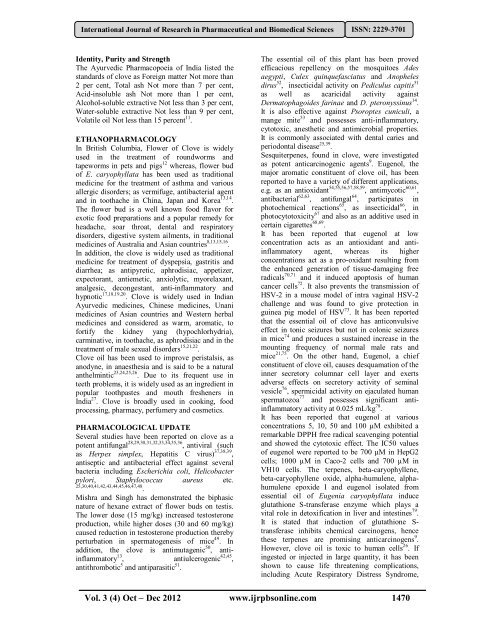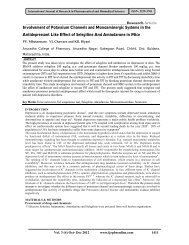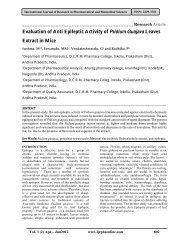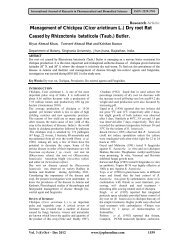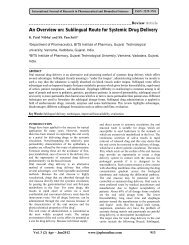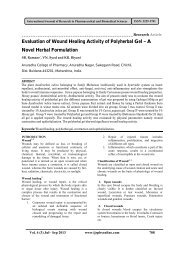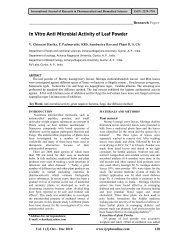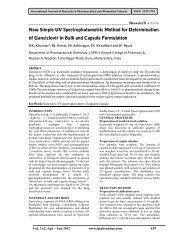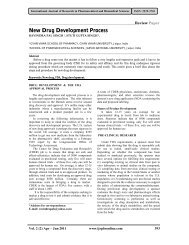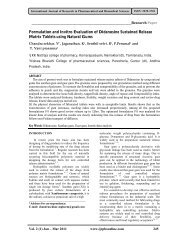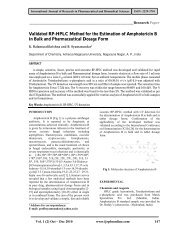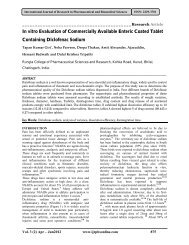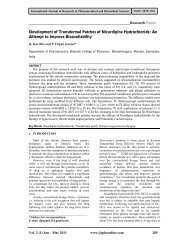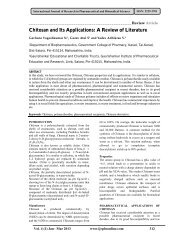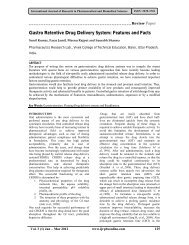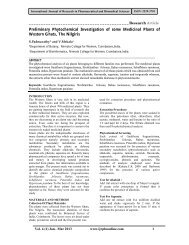Eugenia caryophyllata Thunberg - International Journal of Research ...
Eugenia caryophyllata Thunberg - International Journal of Research ...
Eugenia caryophyllata Thunberg - International Journal of Research ...
You also want an ePaper? Increase the reach of your titles
YUMPU automatically turns print PDFs into web optimized ePapers that Google loves.
<strong>International</strong> <strong>Journal</strong> <strong>of</strong> <strong>Research</strong> in Pharmaceutical and Biomedical Sciences ISSN: 2229-3701<br />
Identity, Purity and Strength<br />
The Ayurvedic Pharmacopoeia <strong>of</strong> India listed the<br />
standards <strong>of</strong> clove as Foreign matter Not more than<br />
2 per cent, Total ash Not more than 7 per cent,<br />
Acid-insoluble ash Not more than 1 per cent,<br />
Alcohol-soluble extractive Not less than 3 per cent,<br />
Water-soluble extractive Not less than 9 per cent,<br />
Volatile oil Not less than 15 percent 11 .<br />
ETHANOPHARMACOLOGY<br />
In British Columbia, Flower <strong>of</strong> Clove is widely<br />
used in the treatment <strong>of</strong> roundworms and<br />
tapeworms in pets and pigs 12 whereas, flower bud<br />
<strong>of</strong> E. <strong>caryophyllata</strong> has been used as traditional<br />
medicine for the treatment <strong>of</strong> asthma and various<br />
allergic disorders; as vermifuge, antibacterial agent<br />
and in toothache in China, Japan and Korea 13,14 .<br />
The flower bud is a well known food flavor for<br />
exotic food preparations and a popular remedy for<br />
headache, soar throat, dental and respiratory<br />
disorders, digestive system ailments, in traditional<br />
medicines <strong>of</strong> Australia and Asian countries 8,13,15,16 .<br />
In addition, the clove is widely used as traditional<br />
medicine for treatment <strong>of</strong> dyspepsia, gastritis and<br />
diarrhea; as antipyretic, aphrodisiac, appetizer,<br />
expectorant, antiemetic, anxiolytic, myorelaxant,<br />
analgesic, decongestant, anti-inflammatory and<br />
hypnotic 17,18,19,20 . Clove is widely used in Indian<br />
Ayurvedic medicines, Chinese medicines, Unani<br />
medicines <strong>of</strong> Asian countries and Western herbal<br />
medicines and considered as warm, aromatic, to<br />
fortify the kidney yang (hypochlorhydria),<br />
carminative, in toothache, as aphrodisiac and in the<br />
treatment <strong>of</strong> male sexual disorders 15,21,22 .<br />
Clove oil has been used to improve peristalsis, as<br />
anodyne, in anaesthesia and is said to be a natural<br />
anthelmintic 23,24,25,26 . Due to its frequent use in<br />
teeth problems, it is widely used as an ingredient in<br />
popular toothpastes and mouth fresheners in<br />
India 27 . Clove is broadly used in cooking, food<br />
processing, pharmacy, perfumery and cosmetics.<br />
PHARMACOLOGICAL UPDATE<br />
Several studies have been reported on clove as a<br />
potent antifungal 28,29,30,31,32,33,34,35,36 , antiviral (such<br />
as Herpex simplex, Hepatitis C virus) 37,38,39 ,<br />
antiseptic and antibacterial effect against several<br />
bacteria including Escherichia coli, Helicobacter<br />
pylori, Staphylococcus aureus etc.<br />
25,30,40,41,42,43,44,45,46,47,48 .<br />
Mishra and Singh has demonstrated the biphasic<br />
nature <strong>of</strong> hexane extract <strong>of</strong> flower buds on testis.<br />
The lower dose (15 mg/kg) increased testosterone<br />
production, while higher doses (30 and 60 mg/kg)<br />
caused reduction in testosterone production thereby<br />
perturbation in spermatogenesis <strong>of</strong> mice 49 . In<br />
addition, the clove is antimutagenic 50 , antiinflammatory<br />
13 , antiulcerogenic 42,45 ,<br />
antithrombotic 5 and antiparasitic 51 .<br />
The essential oil <strong>of</strong> this plant has been proved<br />
efficacious repellency on the mosquitoes Ades<br />
aegypti, Culex quinquefasciatus and Anopheles<br />
dirus 52 , insecticidal activity on Pediculus capitis 51<br />
as well as acaricidal activity against<br />
Dermatophagoides farinae and D. pteronyssinus 14 .<br />
It is also effective against Psoroptes cuniculi, a<br />
mange mite 53 and possesses anti-inflammatory,<br />
cytotoxic, anesthetic and antimicrobial properties.<br />
It is commonly associated with dental caries and<br />
periodontal disease 25,39 .<br />
Sesquiterpenes, found in clove, were investigated<br />
as potent anticarcinogenic agents 9 . Eugenol, the<br />
major aromatic constituent <strong>of</strong> clove oil, has been<br />
reported to have a variety <strong>of</strong> different applications,<br />
e.g. as an antioxidant 54,55,56,57,58,59 , antimycotic 60,61 ,<br />
antibacterial 62,63 , antifungal 64 , participates in<br />
photochemical reactions 65 , as insecticidal 66 , in<br />
photocytotoxicity 67 and also as an additive used in<br />
certain cigarettes 68,69 .<br />
It has been reported that eugenol at low<br />
concentration acts as an antioxidant and antiinflammatory<br />
agent, whereas its higher<br />
concentrations act as a pro-oxidant resulting from<br />
the enhanced generation <strong>of</strong> tissue-damaging free<br />
radicals 70,71 and it induced apoptosis <strong>of</strong> human<br />
cancer cells 72 . It also prevents the transmission <strong>of</strong><br />
HSV-2 in a mouse model <strong>of</strong> intra vaginal HSV-2<br />
challenge and was found to give protection in<br />
guinea pig model <strong>of</strong> HSV 73 . It has been reported<br />
that the essential oil <strong>of</strong> clove has anticonvulsive<br />
effect in tonic seizures but not in colonic seizures<br />
in mice 74 and produces a sustained increase in the<br />
mounting frequency <strong>of</strong> normal male rats and<br />
mice 21,75 . On the other hand, Eugenol, a chief<br />
constituent <strong>of</strong> clove oil, causes desquamation <strong>of</strong> the<br />
inner secretory columnar cell layer and exerts<br />
adverse effects on secretory activity <strong>of</strong> seminal<br />
vesicle 76 , spermicidal activity on ejaculated human<br />
spermatozoa 77 and possesses significant antiinflammatory<br />
activity at 0.025 mL/kg 78 .<br />
It has been reported that eugenol at various<br />
concentrations 5, 10, 50 and 100 µM exhibited a<br />
remarkable DPPH free radical scavenging potential<br />
and showed the cytotoxic effect. The IC50 values<br />
<strong>of</strong> eugenol were reported to be 700 µM in HepG2<br />
cells; 1000 µM in Caco-2 cells and 700 µM in<br />
VH10 cells. The terpenes, beta-caryophyllene,<br />
beta-caryophyllene oxide, alpha-humulene, alphahumulene<br />
epoxide I and eugenol isolated from<br />
essential oil <strong>of</strong> <strong>Eugenia</strong> <strong>caryophyllata</strong> induce<br />
glutathione S-transferase enzyme which plays a<br />
vital role in detoxification in liver and intestines 79 .<br />
It is stated that induction <strong>of</strong> glutathione Stransferase<br />
inhibits chemical carcinogens, hence<br />
these terpenes are promising anticarcinogens 9 .<br />
However, clove oil is toxic to human cells 26 . If<br />
ingested or injected in large quantity, it has been<br />
shown to cause life threatening complications,<br />
including Acute Respiratory Distress Syndrome,<br />
Vol. 3 (4) Oct – Dec 2012 www.ijrpbsonline.com 1470


